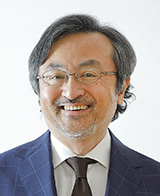About JSOT / President's Message
Message from the 15th President of the Japanese Society of Toxicology
 My name is Yoshito Kumagai (Environmental Biology Laboratory, Faculty of Medicine, University of Tsukuba), and I am honored to be nominated as the 15th President of the Japanese Society of Toxicology (JSOT), effective on July 19, 2018. I will succeed the former President, Dr. Naganuma (Professor Emeritus, Tohoku University), and will serve 2 years in the position.
My name is Yoshito Kumagai (Environmental Biology Laboratory, Faculty of Medicine, University of Tsukuba), and I am honored to be nominated as the 15th President of the Japanese Society of Toxicology (JSOT), effective on July 19, 2018. I will succeed the former President, Dr. Naganuma (Professor Emeritus, Tohoku University), and will serve 2 years in the position.The predecessor society, the Toxic Action Research Group, was formed in 1975, the name of which was changed to the Japanese Society of Toxicological Sciences in 1981, the JSOT in 1997 as we call it today. During this time, the Journal of Toxicological Sciences was issued as the flagship magazine for the Toxic Action Research Group in 1976, and increased journal contributions from abroad accounted for an impact factor of 1.719 as of 2017, indicating its growth as an academic journal of international stature. In 2014, the second academic journal of JSOT, Fundamental Toxicological Sciences, was issued. In the same year, the “JSOT” was launched as a general incorporated association and enacted the Articles of Incorporation based on Society rules.
The membership number (as of May 31, 2018) has exceeded 2600, and the number of councilors has reached 285. However, there are only 143 students, and it is felt that this number must be increased. Meanwhile, the Society has set up a section system at the behest of former President Dr. Naganuma, which is hoped to facilitate the interaction between members and non-member researchers to fulfill and galvanize the field of Toxicology. Since 2014, a collaborative subcommittee has been set up in the General Affairs Committee to galvanize research through hosting symposiums together and across the annual academic conventions on both sides, while the sections host academic conferences on a standalone basis and its members can include non-society members. Both the collaborative subcommittee and the sections are aimed at advancing the field of toxicology and are expected to make significant contributions.
As the newly appointed President, I would like to present to you two of my agendas. The first is my aim to raise more revenue for the Society and the other is globalization. This Society has set up the General Affairs Committee, Financial Committee, Editorial Committee, Educational Committee, and the Science and Publicity Committee, and each has subcommittees, but none are committed to planning and strategizing for increasing revenue. Our Society is unique in that approximately 70% of the members are affiliated to private companies, such as pharmaceuticals; therefore, we are planning to nominate a few Directors from these companies to run a working group as a pilot initiative. Regarding globalization, we are grateful to the efforts made by our Honorary Member Tetsuo Satoh (Professor Emeritus, Chiba University) in bringing together JSOT, the Asian Society of Toxicology (ASIATOX), and the International Union of Toxicology (IUTOX), where former President Jun Kanno (Director of Japan Bioassay Research Center) was the first Japanese nominated as the President in 2016. In the same year, JSOT and the Society of Toxicology held a joint symposium in New Orleans, US, which continues to be held in academic conventions in both countries thereafter. Also, a personal anecdote, I was given the seat of the Secretary General of the 6th ASIATOX International Conference held in Sendai, Japan, in 2012, and then as a councilor (2015-present) and an auditor (2015-present) as well as treasurer (2012-2015) at ASIATOX before holding the current seat as an executive committee member of IUTOX (2016-2019). Based on these experiences, I understand the importance of globalization and wish to build on the efforts made in the past to help the next generation advance the field even further, enhance the scientific rigor at JSOT, and strive harder to advance the process of globalization.
It is said that people are like castles. The collaboration and friendship between people, in and out of this profession, are the keys to a greater leap ahead for the JSOT. We are grateful for your support and excited for the futures that we will together unfold.
July 2018
Yoshito Kumagai, President of the JSOT


